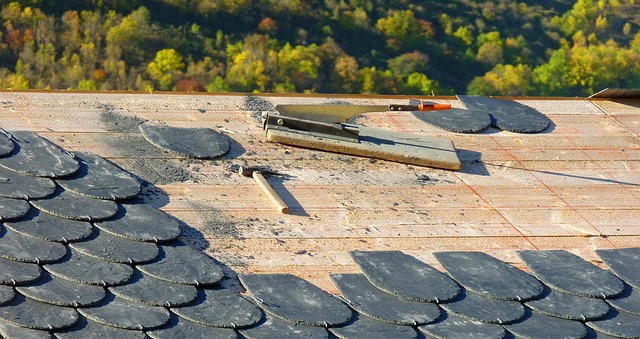Roofer expertise is vital for enhancing building energy efficiency by installing proper insulation and barriers that protect against extreme weather, improving R-value, and reducing energy consumption. Skilled roofers employ reflective membranes, vapor barriers, and specialized coatings to mitigate heat loss or gain, addressing climate and architectural challenges. This knowledge is crucial for meeting modern energy efficiency standards and regulations, benefiting both homeowners and the environment through year-round reduced heating and cooling costs.
Roofer professionals play a pivotal role in enhancing home energy efficiency through strategic insulation and barrier installation. This article delves into the critical task of roofers, exploring how they contribute to energy conservation with innovative solutions. From understanding the impact of roofing on energy usage to uncovering common insulation methods, we dissect the expertise required for optimal results. Furthermore, we guide readers through choosing suitable materials and installation techniques tailored to diverse climates, highlighting long-term savings achievable through roofer-facilitated energy efficiency enhancements.
- Understanding the Role of Roofers in Energy Efficiency
- – The impact of roofing on energy conservation
Understanding the Role of Roofers in Energy Efficiency

Roofers play a crucial role in enhancing energy efficiency through proper installation of insulation and barriers. They are often the first line of defense against environmental elements, ensuring that homes stay warm during winters and cool during summers. By incorporating energy-efficient materials and techniques, roofers can significantly improve a building’s R-value—a measure of its resistance to heat transfer. This not only reduces energy consumption but also contributes to long-term cost savings for homeowners.
Moreover, roofers are skilled in installing various barriers that prevent heat loss or gain. These include reflective membranes, vapor barriers, and specialized coatings that reflect sunlight or radiate heat away from the interior. By understanding the latest technologies and best practices in energy-efficient roofing, roofers can offer tailored solutions that meet specific climate and architectural challenges. This expertise is vital for navigating the complex landscape of modern energy efficiency standards and regulations.
– The impact of roofing on energy conservation

A roofer’s expertise plays a significant role in enhancing a building’s energy efficiency, starting from its roof. Proper roofing installation involves more than just placing shingles; it includes sealing potential energy-wasting gaps and cracks. Energy-efficient roofs are designed to reflect sunlight during warmer months, thereby reducing the need for air conditioning. Additionally, they trap heat during colder seasons, minimizing heating expenses.
Roofers employ specialized materials such as reflective membranes or high-performance insulation to create an effective barrier against temperature exchange. This simple yet powerful step can lead to substantial energy savings—a benefit both for homeowners and the environment. An insulated roof acts as a crucial component in achieving overall energy conservation goals, making it a key area of focus for any professional roofer.
Roofer professionals play a significant role in enhancing energy efficiency through insulation and barrier installation. By understanding the impact of roofing on energy conservation, these experts can significantly contribute to reducing energy costs and carbon footprints. Incorporating the right materials and techniques ensures homes and buildings remain comfortable while promoting sustainability. Thus, roofer services are essential in navigating towards a greener future.
